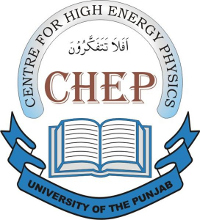 Official Logo | |
| Motto | CHEPIAN |
|---|---|
| Established | 1 November 1982 |
| Research type | Scientific research, education, and energy technologies |
| Budget | Federally funded |
Field of research | |
| Director | Prof. Dr. Bilal Masood |
| Location | Lahore, Punjab, Pakistan |
| Maroon and Light Blue | |
Operating agency | University of Punjab |
| Website | pu.edu.pk |
The Centre for High Energy Physics (CHEP) is a federally funded national research laboratory managed by the University of Punjab. [1]
Contents
- Overview
- Logo, building and research output
- Research and Collaborations
- Leadership
- See also
- References
- External links
The CHEP is dedicated towards the scientific advancement and understanding of high energy physics (or particle physics) — a branch of fundamental physics that is concerned with unraveling the ultimate constituents of matter and with elucidating the forces between them. [1]
The site was established in 1982 with efforts by Punjab University with federal funding to support research activities in quantum sciences that started in 1968, and later engaged in the supercomputing that started in 2004. [1]
